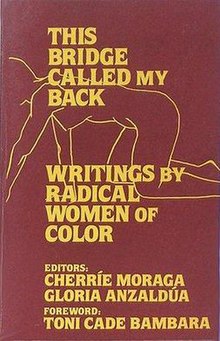This Bridge Called My Back

Cover of the first edition
|
|
| Editors | Cherríe Moraga and Gloria E. Anzaldúa |
|---|---|
| Language | English |
| Subject | Feminism |
| Publisher | Persephone Press |
|
Publication date
|
1981 |
| Media type | Print (Hardcover and Paperback) |
| Pages | 261 pp. |
| ISBN | |
| OCLC | 7513991 |
This Bridge Called My Back: Writings by Radical Women of Color is a feminist anthology edited by Cherríe Moraga and Gloria E. Anzaldúa. First published in 1981 by Persephone Press, the second edition was published in 1983 by Kitchen Table: Women of Color Press. The book's third edition was published by Third Woman Press until 2008, when its contract with Third Woman Press expired and it went out of print. In 2015, the fourth edition was published by State University of New York Press, Albany.
This Bridge centered the experiences of women of color and emphasized the points of intersectionality within their multiple identities, challenging white feminists who made claims to solidarity based on sisterhood. Writings in the anthology, along with works by other prominent feminists of color, call for a greater prominence within feminism for race-related subjectivities, and ultimately laid the foundation for third wave feminism. This Bridge has become "one of the most cited books in feminist theorizing" (emphasis in original).
Though other published writings by women of color existed at the time of This Bridge’s printing, many scholars and contributors to This Bridge agree that the bringing together of writing by women of color from diverse backgrounds in one anthology made This Bridge unique and influential. Barbara Smith, a contributor, wrote that black, Native American, Asian American, and Latina women “were involved in autonomous organization at the same time that we [were] beginning to find each other. Certainly This Bridge Called My Back […] has been a document of and a catalyst for these coalitions.”
In addition to providing the framework for new activist-based coalitions, This Bridge has had a considerable impact upon the world of academia for its linking of feminism, race, class, and sexuality. It also brought “an intellectual framework” of identities based on race and ethnicity to lesbian and gay studies. In this bridge we call home, the anthology published in 2002 to examine the impacts of This Bridge twenty years later, Australian anthropologist Helen Johnson details This Bridge’s effects on institutional teaching environments. She describes how the anthology “has allowed her to offer global perspectives on issues of race, gender, ethnicity, and power against the now antiquated white feminists’ utopian ideal of universal sisterhood.” This Bridge has been hailed for providing an “easily accessible discourse, plain speaking, a return to Third World storytelling, voicing a difference in the flesh, not a disembodied subjectivity but a subject location, a political and personal positioning.”
...
Wikipedia
